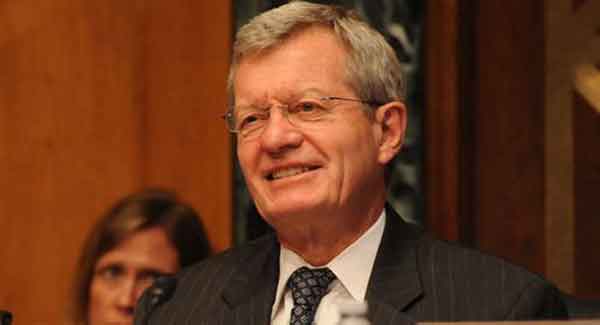当前位置: Language Tips> 双语新闻
Senate Approves Max Baucus as China Ambassador

|
The Senate easily confirmed longtime Sen. Max Baucus on Thursday to become ambassador to China, handing the job to a lawmaker well-versed in U.S. trade policy but with little expertise about military and other issues that have raised tensions with Beijing. Senators gave final approval to the nomination of the moderate Baucus, D-Mont., by 96-0. Trim and youthful looking for his 72 years, Baucus accepted colleagues' congratulations before and during the roll call and voted "present" for his own nomination. Chairman of the Senate Finance Committee, Baucus has worked with Republicans during his 35 years in the Senate on issues ranging from taxes to health care reform — an independent streak that has vexed Democratic colleagues. Baucus supported GOP President George W. Bush's sweeping 2001 tax cuts and his 2003 creation of Medicare prescription drug benefits, despite opposition by most Democrats. He also helped write President Barack Obama's 2010 health care overhaul. Congress approved that measure solely with Democratic votes after Baucus spent months trying to craft a bipartisan version with Republicans. "I'm proud to stand up for it, because it is helping millions of Americans," Baucus said in farewell remarks on the Senate floor after Thursday's vote, defending a law that Republicans are making a top issue this election year. Most recently, he'd been working with Republicans to craft bills revamping the income tax system and streamlining congressional votes on trade treaties Obama is seeking with Asia and Europe. "His passion is well-known to all of us, his decades of experience here in Congress. He's an excellent choice that President Obama made to represent America's interests in China," said Senate Majority Leader Harry Reid, D-Nev. Sen. Orrin Hatch, R-Utah, a long-time Finance panel colleague, lauded the Montanan for "his willingness to put partisan differences aside for the greater good of all." In 2001, Baucus championed China's inclusion in the World Trade Organization, which has helped Beijing conduct business with other countries. He has sponsored legislation — not enacted — punishing China for undervaluing its currency and has criticized Beijing for blocking U.S. imports of beef, a big business in his rural state. Baucus had already announced he would not seek re-election this fall when Obama tapped him last December for the ambassadorship. His early departure from the Senate — spokesman Sean Neary said Baucus planned to formally resign late Thursday — could turn what looked like a likely GOP Senate seat pickup into a more competitive race. Democratic Montana Gov. Steve Bullock planned a Friday news conference at which he was expected to name a temporary replacement for Baucus, perhaps Democratic Lt. Gov. John Walsh. That could let the appointee build a Senate record and gain visibility to defend the seat against expected GOP candidate Rep. Steve Daines. Baucus' confirmation comes as China has emerged as a leading global economic and military power, at times causing strains between Beijing and Washington and its allies in the region. China's economy is second in size only to that of the United States. The U.S. trade deficit with China hit $318 billion last year, far larger than it is with any other country, and the $1.3 trillion in Treasury securities China owns make it the largest foreign holder of U.S. debt. Ties have also frayed as the U.S. has accused China of cybertheft of American intellectual property and of holding down the value of its currency to give a price advantage to its companies trading overseas. U.S. officials have clashed with China over its human rights record, accusing it of mistreating political dissidents and many minority groups. On Thursday, Obama said at the annual National Prayer Breakfast that he has told leaders in Beijing that "realizing China's potential rests on upholding universal rights." Beijing has been modernizing its military forces and engaging in territorial disputes in the seas off East Asia with Japan, South Korea and the Philippines. Baucus will replace Gary Locke, the former Commerce secretary and first Chinese-American to serve as U.S. ambassador to China.
|
据美国媒体报道,美国参议院2月6日以96票支持、0票反对的表决最终批准马克斯•鲍卡斯为新任驻华大使。结果宣布前后,鲍卡斯接受了同事的祝贺。 鲍卡斯现年72岁,是蒙大拿州人,现任参议院财政委员会主席。这位国会议员精通美国贸易政策,但不太了解导致中美关系紧张的军事及其他问题。在参议院工作35年期间,他一直与共和党人合作,解决从税收到医疗改革等一系列困扰民主党的问题。 虽然大多数民主党人表示反对,但是鲍卡斯支持了共和党总统乔治•布什2001年的全面减税计划,并在2003年创立了医疗保险处方药福利。 他还帮助奥巴马总统起草2010年的医疗改革修订案,并与共和党合作数月,精心制订出代表两党的医疗改革方案,获国会批准。 6日的投票结束后,鲍卡斯在参议院的告别讲话中表示为支持这次医疗改革而骄傲,因为它帮助了数百万美国人。 最近,他一直与共和党人合作精心制订改革所得税制度的法案,并帮助奥巴马政府在与欧洲、亚洲签署贸易协定一事上寻求国会的支持。 “他在国会工作数十年,他的热情我们众所周知。他代表美国在中国的利益,是奥巴马总统做出的最佳选择。”参议院共和党领袖内华达州民主党人哈里•里德说。 犹他州共和党参议员奥林•哈奇也称赞他“为了大家的更大利益,愿意抛开党派分歧”。 2001年,鲍卡斯支持中国加入世界贸易组织,有助于中国开展国际贸易。鲍卡斯也曾试图立法处罚中国压低人民币汇率,但没有实行。另外,来自农业重地蒙大拿州的他还曾批评中国禁止进口美国牛肉。 去年12月奥巴马推选他出任大使时,鲍卡斯已经宣布今年秋天不会再寻求连任财政委员会主席。据发言人肖恩透露,鲍卡斯6日正式辞职。他的提前离开可能会使参议院席位的竞争更加激烈。 蒙大拿州州长、民主党人史蒂夫•布洛克打算在7日召开新闻发布会,宣布临时代替鲍卡斯的人选——可能是民主党副州长约翰•沃尔什,为争取参议院席位做准备。 相关阅读 (信莲 编辑:王琦琛)
|
|
|
上一篇 : 美国警告称恐怖分子或对索契冬奥会发动“牙膏炸弹”袭击
下一篇 : Ipad婴儿座椅引发对婴儿屏幕时间的关注
电话:8610-84883645
传真:8610-84883500
Email: languagetips@chinadaily.com.cn